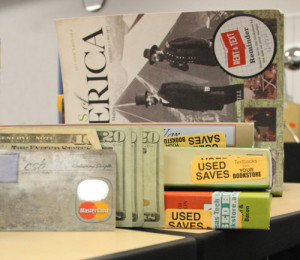 By Jesse Garwick. Nobody likes paying more than what they have to: especially for a short-term-use item like a textbook. Some students even say they never used their textbook in class, and it was just a waste of their money.
By Jesse Garwick. Nobody likes paying more than what they have to: especially for a short-term-use item like a textbook. Some students even say they never used their textbook in class, and it was just a waste of their money.
Fortunately, there are plenty of alternatives to simply purchasing brand new textbooks at full price.
Lori Richards, bookstore manager at the DMACC Ankeny campus, said, “The textbook cost is determined by the publisher and the contract margin between DMACC and Follett Higher Education Group, the bookstore staff has no control over that fact. What we can dois offer the students a number of options in regards to how much they want to spend on their text.
This includes purchasing new or used textbooks, digital or e-books, and the option to rent a textbook. Rental is the lowest initial cost option for the student.”
The option to choose from new or used textbooks has been around for quite some time, but the rental program at DMACC is relatively new: it started up in Fall 2010. It offers the option of paying a lower initial cost for the textbook and returning it at the end of the semester.
Richards said, “The rental program is not for everyone. Students who use the textbook as a reference throughout the course of their studies would be wiser to purchase the text. The rental program is good for those who are able to honor the written contract and follow the rules of the text rental program. As long as they return the books on time, they can avoid paying non-return and late fee charges.”
Another option that is becoming more popular is the E-books. Students can purchase a digital book at a lower cost than a regular textbook, and have the digital files for reference on many electronic devices.
Many students and instructors believe E-books are going to be used more in the future. However, this would not necessarily mean that standard textbooks are going away.
Jeremy Turgasen, DMACC bookstore textbook manager, said, “Textbooks are going to be around, at least for the near future. There are many different ways of teaching, but textbooks have been used for so long that it would really be tough to just eliminate them.”
Another suggestion would be to have a student book exchange. Students could get together and sell their old textbooks that they don’t need anymore to newer students going through their same program. This could result in a lower cost for the new student and a higher buy-back rate for the selling student.
In some fields, such as computer science, the textbook updates so often that an exchange would not be viable, since the books would be outdated. But other fields, like mathematics, keep the same book for years, making this a good finance solution.
A student book exchange would be student-driven. If students want to form a group exchange and save money on textbooks, they will have to take the initiative and do it themselves. This is a very attainable solution.
Textbooks are something every college student will experience at one point or another. “I think textbooks will always be necessary, no matter what products are on the market. Nothing can replace the knowledge of the written word on a page,” Richards said.
In the end, it is up to the students themselves to save money on their books, no matter where they purchase them. “My advice is just to look at all of your options: E-books, rentals, used books, etc. Just choose what works for you.” Turgasen said.





Comments